QuestionHi, my cat has just had a litter of five kittens, and i was wondering when is the best time to introduce food? i have heard a lot of different times to start them on food, and i am also a bit confused about which food is best for them, wet, dry, etc. Also, when will the kittens be able to be completely removed from their mother, and are there any other important steps i need to take to ensure their health? Thankyou for your time
AnswerCandy,
My recommendation would be to allow mom to gradually wean her kittens, she should go ahead and do that around 8-9 weeks of age. Be sure to keep mom indoors as she may become pregnant again very quickly if you don't and you would end up having to find homes for litters born nearly back to back (one litter weaned and adopted out just as another arrives) and it's not good for mom to become pregnant again so quickly. Normally kittens will begin to imitate their mother in terms of eating solid food once she's started to wean them, contrary to popular belief when a mother cat is healthy, eating a high quality diet in appropriate quantities (let mom determine that, she's nursing rapidly growing babies at this point so she should be able to eat as much as she likes to maintain her own weight and support the growth of her kittens) and coping with the litter appropriately (sometimes with larger litters pet parents must step in and offer supplementary feeds with kitten milk replacer) mom doesn't need any help to wean her babies. The kittens should be kept with their mother until they're at least 12 weeks old (in a real crunch you can adopt them out at 10 weeks, but it's best all around for them to be 12 weeks at least since they learn important life and social skills from their mother and litter mates). If the kittens haven't started trying to eat solids at 6 weeks old then you can gently help things along by wiping a small amount of a high quality canned cat food or meat based baby food onto their noses and they will instinctively lick it off. In most cases these babies will begin to lick food off of your fingers (do be careful, kitten milk teeth are very sharp and some kittens are overly enthusiastic without ever meaning to hurt their human caregivers), all you'd need to to at that point is to keep putting food onto your fingers and gradually moving closer to the plate - kittens get the idea quite quickly for the most part although some are more stubborn than others.
When it comes to nutrition there are many different opinions out there, many veterinarians receive their education about nutrition from the pet food industry and let's face it their goals are self serving, they want to make more money so they're not going to pass on objective information about the quality of their food or the individual ingredients that go into it. I'd recommend that you check out catinfo.org, catnutrition.org and www.felinespride.com for nutritional information, these folks know what they're talking about and the beautiful thing is that the information they provide you with all makes sense. For information about some of the scarier things in pet food and how to avoid them for the long term health and safety of your cat and her babies I'd suggest checking out http://www.halopets.com/pet-education/pet-articles/pet_food_what_you_need_to_kno... Be prepared, there is an awful lot of information between the four sites that I've recommended but I have to say that I feel confident the information on the websites is accurate and honest. Before finding these websites I spent hours and hours writing out long, complicated answers about nutrition and that made it difficult for pet parents to read everything in a single sitting as well as taking valuable time away from my day that could have been spent helping other pet parents with their concerns and I have to say it's awfully nice for everyone that I'm able to provide the same information without taking up the time and space that my answer did before.
The Menu Foods pet food recalls of 2007 nearly cost my eldest cat MC her life, she developed severe acute renal failure and two different veterinarians recommended euthanasia as they didn't expect her health to improve, instead the general consensus was that my baby girl would get progressively worse and her kidneys would shut down and ultimately cause her death. I was truly horrified on a number of levels. I had difficulty processing the fact that MC (short for Miracle Cat and believe me she's lived up to her name a few times in her lifetime) was so seriously ill without an apparent cause - all the emergency vet said was that middle aged cats often developed renal failure suddenly which I found hard to believe considering the fact that our veterinarian had examined MC from head to toe only a month or two before this major catastrophe nearly knocked us off of our feet and found her to be 100% healthy with the exception of some dental issues which she's had throughout her entire life. While I know that nobody's ever really ready to say good-bye to a much loved pet I have to say that at that time I was completely in shock and I definitely wasn't anywhere near prepared to lose a young, healthy cat (she was only 8 at the time). At that point I didn't know much about the pet food recalls and I was feeding what I believed to be a nutritious, high quality cat food that was safe. It's a brand often recommended by veterinarians so I assumed that counted for something and that the food was superior in quality and safety to other pet food brands on pet supply store shelves. I was wrong, but I wouldn't find that out until much later.
MC and I have a special bond that's deeper than most, she's my baby girl, we've been through a lot of life experiences together and I've grown up with her. I was only 20 when MC came into my life and her zest for life, confidence loyalty and love have taught me so much about life in general. With MC I'd have to say that our relationship differed from any other cat or kitten that I'd cared for, rescued or rehabilitated up until that point because I knew that I wasn't going to re-home her, ever. I answered an ad seeking permanent homes for a litter of 7 week old kittens after losing another cat to renal failure. I didn't know whether I'd ever get another cat after that heartbreak but I quickly decided that I couldn't bare the emptiness in my newly pet free home, I missed having someone who loved me unconditionally come to greet me and my heart ached for that bond. As much as sharing a bed with a small being that somehow magically transforms into a bed and blanket hog seemed like a nuisance I missed having a furry little bed companion, when I turned in at the end of each day my heart broke anew because I knew I wouldn't be pushed to the edge of the bed or have the blankets snatched away by an otherwise compact feline companion. After losing my other cat I vowed that I wouldn't get another pet since it hurt so much to lose them but I found myself unable to stick to that promise, it seemed to me that it was better to love and lose a pet than to have an empty void where love for a pet should have been. I answered an ad for kittens needing adoptive homes and I was shocked to find a litter of kittens that were roughly 7 days old. I adopted MC and hand raised her, she is definitely my baby and has been since before she opened her eyes which has created a unique and precious bond between the two of us.
Instead of taking the emergency vet's advice and euthanizing MC immediately to relieve her suffering I decided to take her to our family vet in a few hours. I brought along the x-ray that was taken and a copy of her blood results so that our vet could help us make the best possible decision about MC's course of treatment since we trust and value our family vet's opinion. Once our vet examined MC and looked over her blood test results she told us that she really didn't feel that the situation was hopeless. Based on our vet's medical opinion we decided to treat MC and see if she could recover enough to come home even if it meant that we would have to provide ongoing nursing care for the remainder of her life. Once we made our decision the vet sprang into action and hooked MC up to an IV line so she could recieve fluids to flush the toxins out of her system. 24 hours later my heart sunk as our vet told me that there wasn't any improvement, in fact MC's kidney values had deteriorated slightly so we began bracing ourselves for the worst case scenario. Our vet decided not to repeat the blood tests in 24 hours, instead she waited 48 hours before repeating the blood work so that MC's kidney function had a chance to improve.
24 hours after the first repeat blood work was done I went to visit my baby girl in the hospital knowing that it might be the last time we'd spend time together without the pain of euthanasia lingering in the immediate future. I spent an hour talking to her, cuddling her and letting her know just how much she means to me and I have to admit it was difficult to leave her that night but I did so knowing that one way or the other her suffering would be over within a few days. 24 hours after my visit the vet ordered repeat blood work and we waited by the phone trying to occupy ourselves with small talk knowing that everything hinged on this phone call, these test results. When the phone rang we tried to prepare ourselves to recieve the worst news so we were stunned to hear that MC's blood work was now completely within the normal range and we could pick her up the following morning. We were ecstatic, I don't think my husband or I slept more than 5 minutes all night. In the morning we set off for the vet clinic overjoyed that we were going to be bringing our baby girl home instead of bringing down the final, merciful curtain of euthanasia and sending her to the Rainbow Bridge while our hearts shattered into millions of pieces.
Of course we were very excited to be bringing MC home, in fact we still view her incredible determination and will to survive as part of the overall miracle that allowed her to get better. Since we started out quite early we ended up being more than an hour early to pick our baby girl up so we had to wait until the vet was in before MC could be discharged from the hospital. While we waited our favorite technician brought us inside and settled us into the extra exam room so that we could spend some time with our baby girl after she took MC's final set of vital signs for her chart. Once MC's final set of vitals was taken the technician brought our girl to us so that we could visit until we'd received formal discharge instructions. During those few minutes we were taught how to administer supplementary fluids under our girl's skin and the technician told us about the expensive prescription diet that MC would be prescribed most likely for the remainder of her life. We got a good laugh out of the fact that MC was obviously better, she was back to her spunky, mischevious self. When she came into the exam room she had the familiar bounce in her step and the technician told us that MC had swatted the thermometer out of her hand when she tried to take her temperature (I can't say I blame MC, I sure wouldn't want my temperature taken rectally either). When the vet came in we were given discharge instructions and we were thrilled to be heading home. MC and I made up for lost time and cuddled the whole way home, I couldn't help but greedily take in her soft fur, her precious purr, the warm bulk in my lap and the realization of just how close we'd come to losing my baby girl.
My experience with the pet food recalls really changed my perception about the safety of pet food as well as the information pet food manufacturers want pet parents to believe. After countless hours of researching feline nutrition, popular pet foods and learning about the unique features of our feline friends I've come to realize that many pet food manufacturers spent countless time, energy and money trying to get us to believe that their food is the healthiest and most nutritious food available and far too many of these companies seem to be determined to charge as high a price as possible for the lowest quality ingredients out there. In Canada and the United States there are far too few laws regulating what manufacturers can and can't put into pet food, what specific ingredients can or can't be considered pet food, how the food should be labelled and the frequency of testing the safety and nutritional value of their products. As far as commercially manufactured foods I'm not sure what's available in your area so I'll make my recommendations about specific brands and let you check out ingredient lists so that you can find similar products in your area if you can't get these specific cat foods in your area. When it comes to nutrition for your feline companions as far as I'm concerned the absolute best possible food you can feed would be made at home from high quality organic meats and supplements but I realize that not all pet parents want to take on such a project for a variety of reasons including cost, time constraints and other issues. There are suitable and safe alternatives to feeding a homemade raw diet, you could purchase a high quality raw diet such as Feline's Pride or a similar product OR you could feed the highest quality, most nutritious and species appropriate canned cat food. I don't suggest bothering with most of the cat foods out there, too many of them have been recalled for one safety concern or another. The only two commercial cat foods that I feel comfortable recommending are Spot's Stew by Halo or Wellness, these products both contain high quality human grade ingredients such as butcher quality meat and high quality produce rather than the scraps left over after the food is prepared for human consumption.
In terms of ensuring that your new kittens are as healthy as possible I'd suggest that you consider doing some basic things to help keep these little ones healthy. Make sure that your mother cat doesn't have fleas or ticks, external parasites can cause fatal blood loss in young kittens. If your queen does have any external parasites then I'd suggest speaking with your veterinarian about administering Advantage which is one of the safest topical monthly medications out there and you can administer it to mom while she's nursing which will kill any parasites on the kittens since they're in such close contact with the queen. Deworming the kittens should be done when they're old enough that your vet feels comfortable doing so. I'd suggest a broad spectrum medication like Drontal because it kills most intestinal parasites. Frontline does make a product for cats that's dosed by weight and is designed to kill internal and external parasites, but from what I understand it's not as safe as Advantage, most likely because it hasn't been around as long. It really is a good idea to vaccinate your kittens when they're old enough that your vet feels comfortable doing so. The reason that vaccines are important is because kittens are born with very immature immune systems leaving them susceptible to viral and bacterial infections, as they nurse on their mom they receive temporary protection from her antibodies passed to them through breast milk and those immunities do not last forever. Ideally you'll want to vaccinate the kittens before mom's antibodies wear off. There is some new research about vaccines and our feline friends that seems to suggest that we've been over vaccinating our cats for some time now. Many vets are beginning to feel that there is a connection between frequent vaccinations and certain autoimmune conditions, renal failure, and certain types of cancer. Some vets recommend against vaccinating cats or kittens at all, other vets believe that vaccines play no part in the increased incidences of certain illnesses. I believe that this situation is not entirely black and white, our own vet recommends cycling vaccines which means that your cat or kitten shouldn't receive any more than a single vaccine at any given appointment and handling vaccines this way means that your kitties will not always receive a vaccine when they go to the vet for their annual check up. You will need to follow your local laws regarding vaccinating against rabies, but if at all possible my feeling is that you should use the 3 year vaccine rather than vaccinating your cat every year to minimize exposure to the vaccines. If you don't want to expose your cat to any unnecessary risks associated with vaccines you can have the vet perform a blood titer test which measures the cat's (or dog's) immunity to a given illness, if the cat meets the minimum level for immunity they don't need to be vaccinated for that specific illness. Another very important part of ensuring that your cats/kittens are as healthy as possible is spaying and neutering. Having a cat sterilized offers many behavioral and medical benefits. Cats that are spayed or neutered aren't as likely to wander over large areas in search of a mate, howl or caterwaul to advertise their availability to mate or their willingness to fight over a potential mate. Sterilized cats are also less likely to use urine or feces to mark their territory which means they're less likely to be euthanized for problem behaviors. Spaying and neutering a cat early reduces and prevents certain types of cancer such as reproductive cancers (uterine, ovarian, testicular, prostate and mammary) which can mean your pet will live a longer, healthier and happier life. Unspayed female cats can develop a potentially lethal uterine infection called pyometra which causes the uterus to fill with pus, if the womb ruptures infected material will spread throughout the cat's abdomen most likely with fatal consequences. The treatment for pyometra is an immediate emergency spay which is substantially more expensive than a routine spay, this surgery is also significantly more complicated and a sick cat is more likely to have complications or adverse reactions to the anesthesia. I realize that taking these kittens to the vet will be expensive, but you can defray that cost by having the adoptive families reimburse you for the cost of the medical care their kitten(s) have received prior to being adopted. If someone isn't willing to pay for the medical care their kitten has received they most likely aren't serious about providing a permanent home for that kitten. If you have any further questions, concerns or you'd like me to clarify anything in this answer please feel free to contact me again and I'll do my absolute best to help you out.

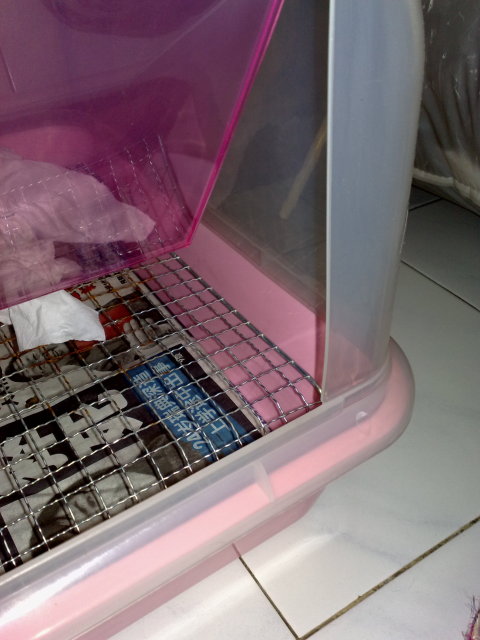 My cat doesnt piss on his litter box
QuestionLitter box
QUESTION: My 7months stray ca
My cat doesnt piss on his litter box
QuestionLitter box
QUESTION: My 7months stray ca
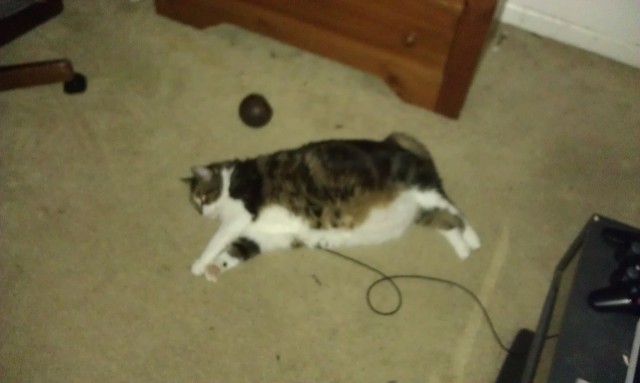 what type of cat is mine?
Question
zella
Ok this cat is very big one of bi
what type of cat is mine?
Question
zella
Ok this cat is very big one of bi
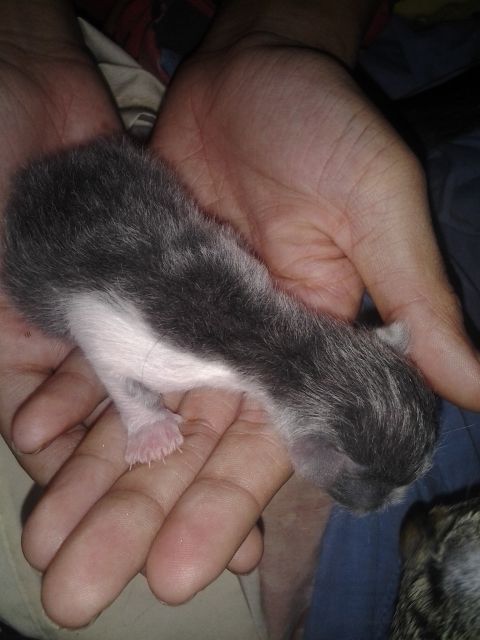 Trouble with my Two female cats.
Question
The kitten Two Cats
Hello, I have
Trouble with my Two female cats.
Question
The kitten Two Cats
Hello, I have
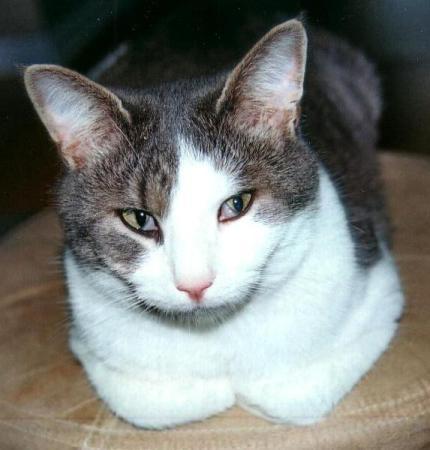 third eyelid, weight gain, irritability
Question
third eyelid pic
I have a 2 year old male cat
third eyelid, weight gain, irritability
Question
third eyelid pic
I have a 2 year old male cat
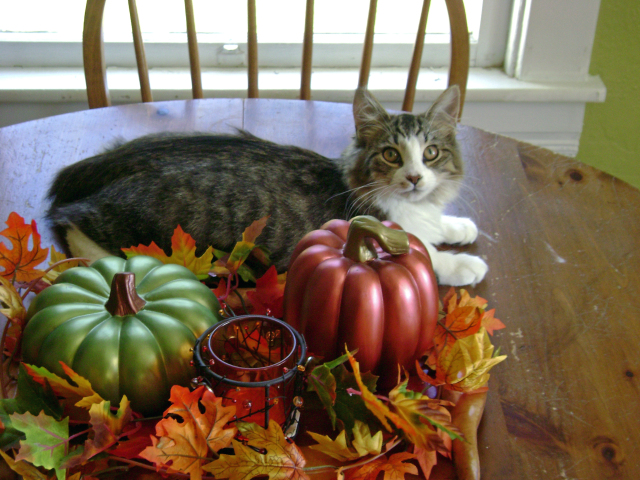 The breed of my 5 1/2 month old kitten
Question
Edmund 5 1/2 months ol
Hi, my husband and I re
The breed of my 5 1/2 month old kitten
Question
Edmund 5 1/2 months ol
Hi, my husband and I re